CBD facts every user should know – IMPORTANT
Estimated reading time: 11 minutes
- Introduction
- 1. CBD is legal, but only if it's derived from hemp
- 2. It is psychoactive, but also non-intoxicating
- 3. Cannabidiol generally works better with other cannabis compounds
- 4. CBD interacts with several systems in the body
- 5. Not all are created equal
- 6. CBD dosing isn't an exact science yet
- 7. This is generally safe
- 8. CBD may effectively treat anxiet
- 9. CBD is therapeutic for dogs
- 10. It's legal to fly with hemp-derived CBD, but risky
- FAQ – CBD Facts
- The Real CBD Products
Introduction
A 2019 Gallup poll found that 1 in 7 Americans, or 14%, use CBD in some form, mostly for medical reasons. The number of people who use CBD continues to grow, and consumers and patients are becoming more interested in what CBD is and how it works.
Even though CBD products are becoming more popular, there is still a lot of misinformation about this non-intoxicating cannabis compound. This means that the average consumer needs more educational resources and guidelines. What does CBD stand for? How does it work? Is it legal? What should buyers of CBD oil and other CBD products look for?
All of these are important questions that a person interested in marijuana or a medical patient might have. Here are 10 important facts about CBD that every potential and the current user should know. This will help you make a better decision.
1. CBD is legal, but only if it's derived from hemp
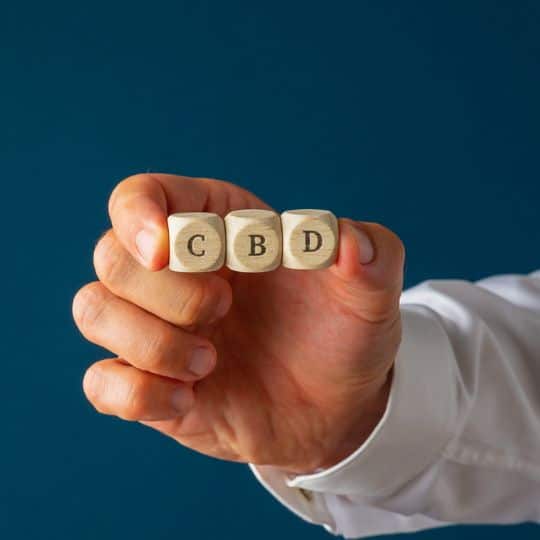
To anyone unfamiliar with CBD, it may seem strange to see something that comes from cannabis gain such widespread attention across the globe. CBD from marijuana or hemp with more than 0.2% THC is considered legal in a lot of European coun. The laws vary significantly from country to country, so check how the law is in your local area.
2. It is psychoactive, but also non-intoxicating
One of the best things about CBD is that it is both therapeutic and “non-psychoactive.” This is in contrast to THC, which is very psychoactive. Even though you might read this “fact” about CBD a lot, it's not true that CBD has no psychoactive effects.
CBD is psychoactive in the sense that it affects thinking and feeling directly. It is most well-known for making people feel calm, which is one of its psychoactive effects. CBD, on the other hand, doesn't get you high as THC does, so it's not a drug. THC is also a psychoactive drug, but because it can make people temporarily less smart, it is called an intoxicant. Some people think of CBD as a “non-psychoactive” cannabinoid because it doesn't make people feel high.
CBD oil usually comes with a dropper so that people can measure how much they need.
3. Cannabidiol generally works better with other cannabis compounds
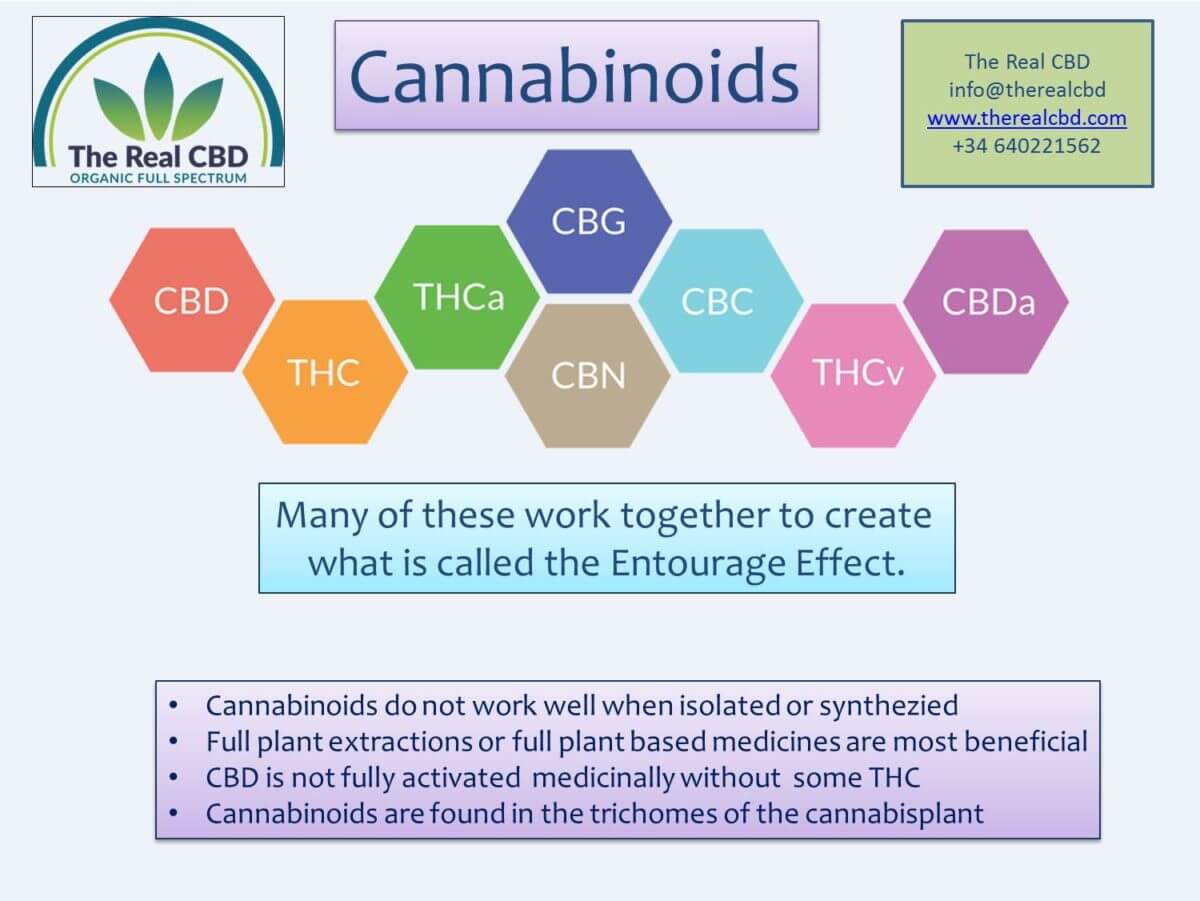
A 2015 study from The Hebrew University of Israel documented the medicinal potency of single-molecule CBD extract versus that of a whole-plant, CBD-rich extract. The single-molecule extract is an isolated extract of a single compound, such as CBD. A whole-plant extract essentially preserves the full cannabinoid and terpene profile of the original plant.
The study concluded that whole-plant, CBD-rich extract had a superior therapeutic value. There may be cases, depending on an individual patient's condition and physical restrictions, where a CBD isolate is more appropriate.
However, a whole-plant, high-CBD product has the advantage of working in tandem with other potentially therapeutic cannabinoids and terpenes. This synergistic relationship is commonly referred to as the entourage effect. For instance, some studies have demonstrated CBD's ability to minimize the undesirable effects of THC, including paranoia and cognitive impairment.
4. CBD interacts with several systems in the body
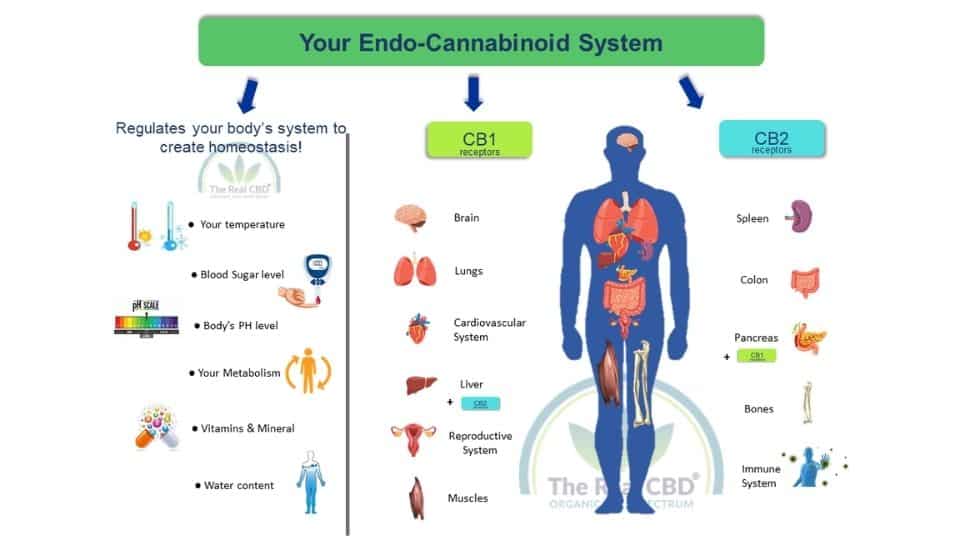
A major explanation for CBD's wide range of potential benefits is the complex way it interacts with our bodies. Particularly through the endocannabinoid system (ECS), an internal system made up of endogenous cannabinoids. Endocannabinoids, the receptors that these cannabinoids bind to, and the enzymes that break them down. CBD produced by the cannabis plant, bind to cannabinoid receptors when they enter the body. This creates a wide range of effects, depending on which receptors they activate.
Research suggests that CBD may reduce the absorption of the body's pain-regulating endocannabinoid anandamide, which could lead to pain relief. CBD has also been shown to reduce epileptic seizures by inhibiting the release of neurotransmitters.
CBD also elicits therapeutic responses from the body through non-ECS receptor pathways. For example, CBD may activate serotonin receptor 5-HT1A in mice, making it potentially helpful in treating depression and anxiety. It may also suppress chronic pain and inflammation by targeting alpha-3 glycine receptors according to research conducted on rodents.
More from our blog:
5. Not all are created equal
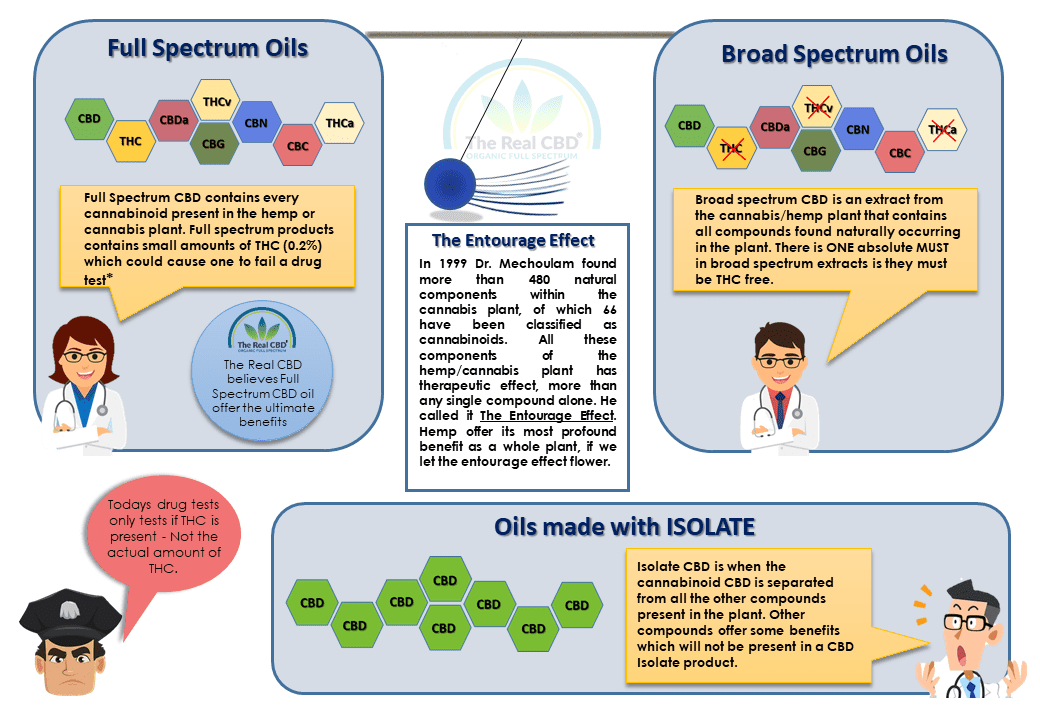
If you have had limited experience shopping for CBD oil, you may wonder where to start, or how to find a quality product. Firstly, industrial hemp is a common CBD oil source. There are also several types and formulas on the market, which typically fall into one of three categories:
- Full Spectrum contains the full spectrum of CBD, minor cannabinoids, cannabis-derived terpenes, and trace amounts of THC.
- Broad Spectrum contains a full spectrum of extracted cannabinoids and terpenes, but with trace amounts of THC removed.
- Isolate is pure CBD with all other cannabis compounds removed until only a powdered or crystalline form of CBD remains.
As the FSA (Food Standard Agency) begins to crack down on CBD oil labels with unproven claims, you should read their product labels carefully.
In addition, it's also important to note that not all CBD oils and CBD-infused products are created equal. Some reputable CBD companies adhere to strict labelling standards. Others falsely advertised CBD products with vague labels with buzzwords like “pure,” “all-natural,” and “organic” can be deceiving. Also beware of products labelled hemp seed oil, which usually does not contain any CBD at all. You should still be on the lookout for the following on all CBD oil labels:
- Amount of active CBD per serving
- Supplement Fact Panel, including other ingredients
- Manufacturer or distributor name
- Suggested use
- Distinction as full spectrum, broad-spectrum, or isolate
- Batch or date code with a link to the laboratory results for that batch. If the product wasn't lab-tested, don't buy it.
6. CBD dosing isn't an exact science yet
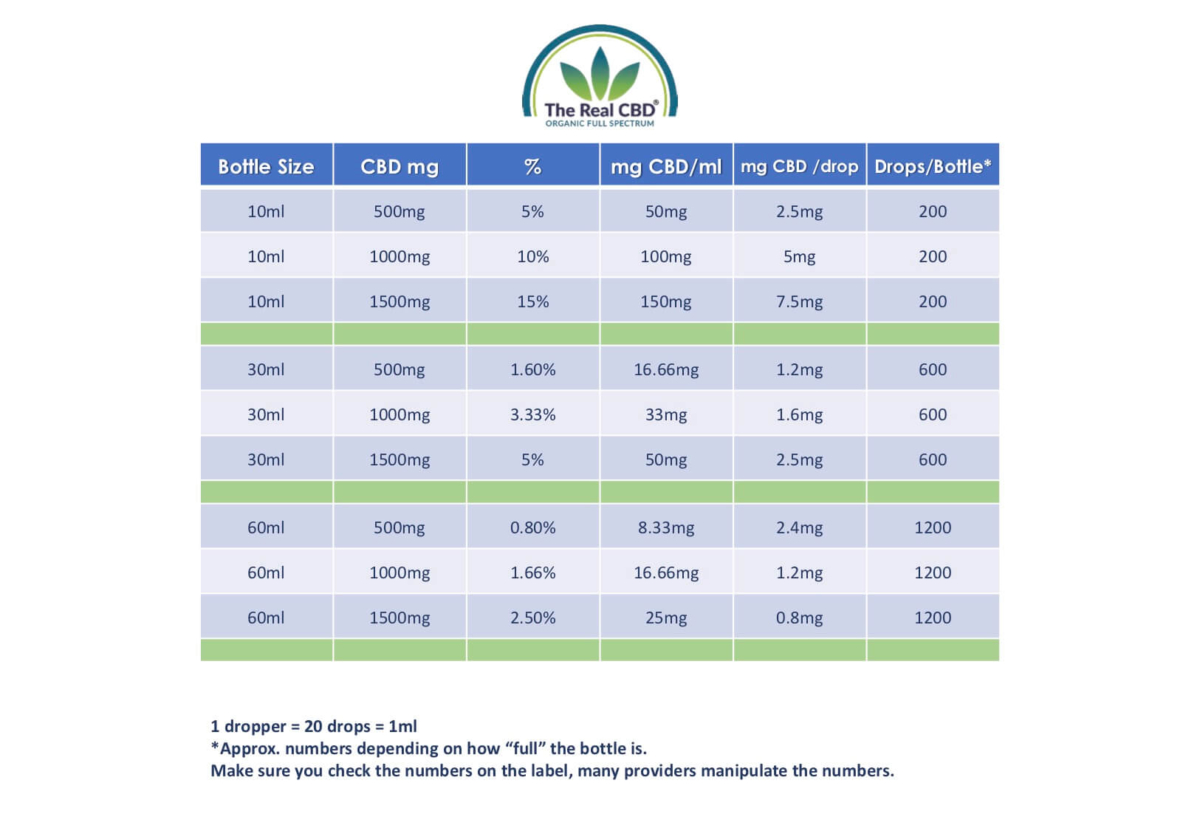
When it comes to finding the best CBD dose for a certain condition, there is no exact measurement that works for everyone. Part of the reason may be the way our bodies react to CBD. It depends on how our cannabinoid receptors are changed by our genes. What works for one person may not work for someone else. There are a few other things that affect how well a CBD dose works, such as the product itself, how it is taken, and how the patient or consumer's body works.
7. This is generally safe
So, if we can't figure out what dose is best for treating most illnesses, what does that mean for people who have never used CBD before? Lucky for us, it's easy to just start with small doses and slowly increase them. Why? Because a study from 2011 and an update from 2017 show that CBD has what doctors call a “favourable safety profile.” This is because it doesn't change major things like heart rate, blood pressure, body temperature, or mental functions.
It has also been shown that doses of up to 1,500 mg per day are safe, even when taken for a long time. Several CBD-related studies, however, have found that CBD can cause side effects, such as extreme sleepiness, loss of appetite, diarrhoea, fatigue, convulsions, and vomiting. There is also evidence that CBD can make some prescription drugs less effective, so it's best to talk to a doctor or pharmacist before taking CBD orally with a prescription drug.
8. CBD may effectively treat anxiet
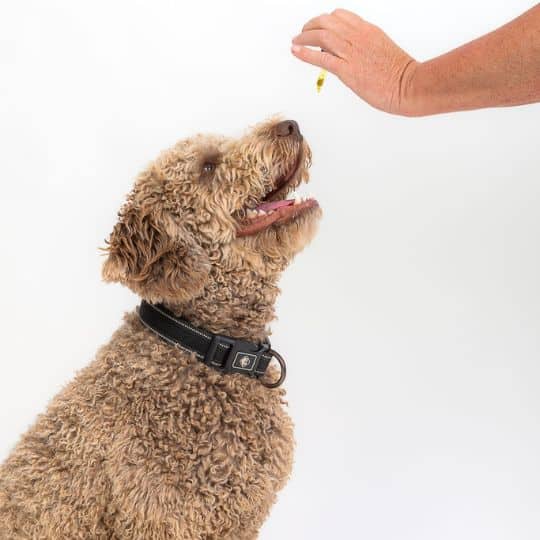
Even though it can be hard to figure out the best dose of CBD, more and more research is giving us a better idea of how to use this non-psychoactive cannabinoid. For example, a study published in the February 2019 issue of “The Brazilian Journal of Psychiatry” found that CBD may be helpful for treating social anxiety related to public speaking. Before a public speaking challenge, the research team gave the people they were studying doses of CBD that ranged from 150 to 600 milligrammes, as well as a placebo. The study seemed to show that 300 milligrammes helped ease the symptoms of anxiety.
A study published in the Brazilian Journal of Psychiatry in February 2019 found that 300 milligrammes may be the best dose for treating social anxiety caused by speaking in public.
9. CBD is therapeutic for dogs
CBD has the potential to be an effective treatment for a variety of conditions that affect pets, including arthritis, seizures, and more. In addition to these benefits, CBD oil might also help a dog's immune system, make its coat more lustrous, and even make its breath smell better. There is a need for additional investigation into how helpful CBD is for dogs, cats, and other animals as pets; nonetheless, the evidence that is now available suggests that CBD may provide a vast array of advantages to man's best friend.
More from our blog:
10. It's legal to fly with hemp-derived CBD, but risky

On international flights, it is strongly advised against carrying CBD with you. Even if you believe you will be travelling to a nation in which the transportation of CBD through the air is legal, you should be aware that this is not always the case. Even transporting hemp that only has CBD in it can result in severe fines and penalties in some countries. This is especially true in Croatia, where the possession of cannabis containing THC carries a prison sentence ranging from three to fifteen years. Not to mention the most extreme circumstances, such as the fact that the death penalty is still used in some parts of sub-Saharan Africa.
FAQ – CBD Facts
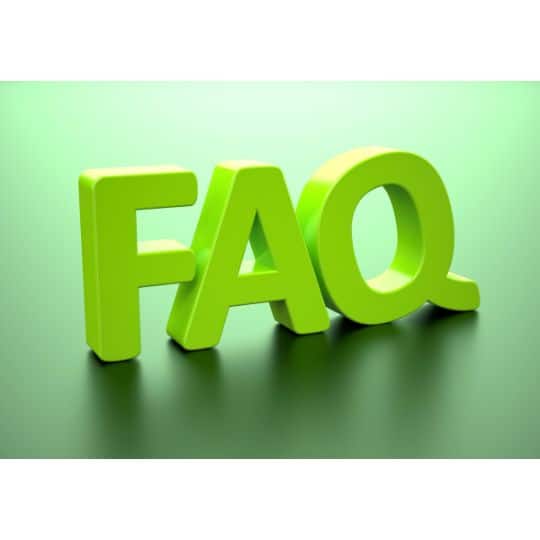
CBD stands for Cannabidiol, a compound found in cannabis plants. It is legal in many countries if derived from hemp and contains less than 0.2% THC, but laws vary, so it's important to check local regulations.
CBD is considered psychoactive because it can affect mood and feeling, particularly promoting calmness, but it is non-intoxicating. Unlike THC, CBD does not produce a high, making it appealing for therapeutic use without the psychoactive effects associated with marijuana.
CBD interacts with the body's endocannabinoid system (ECS) and other receptor pathways, potentially affecting pain regulation, reducing epileptic seizures, and offering anti-inflammatory effects. Its interaction with various systems can lead to a range of potential benefits.
Full-spectrum CBD products contain the full range of cannabinoids, including trace amounts of THC. Broad-spectrum products also have a range of cannabinoids but without THC. Isolates are pure CBD, with all other compounds removed, providing a THC-free option.
Starting with small doses and gradually increasing is advised due to CBD's favorable safety profile. Doses up to 1,500 mg per day have been deemed safe for long-term use. However, it can cause side effects in some, and interactions with prescription medications are possible, so consultation with a healthcare
The Real CBD Products
-
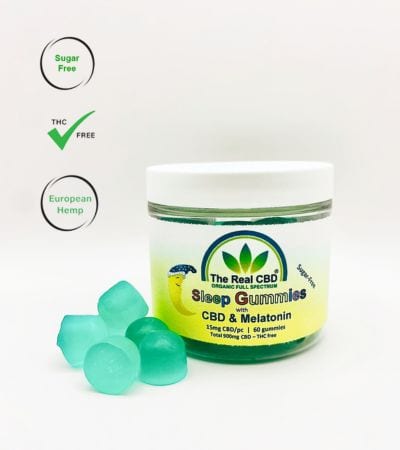 CBD Sleep Gummies€29.00
CBD Sleep Gummies€29.00 -
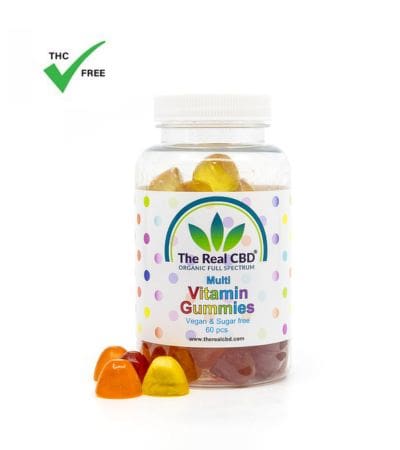 Multivitamin gummies€15.00
Multivitamin gummies€15.00 -
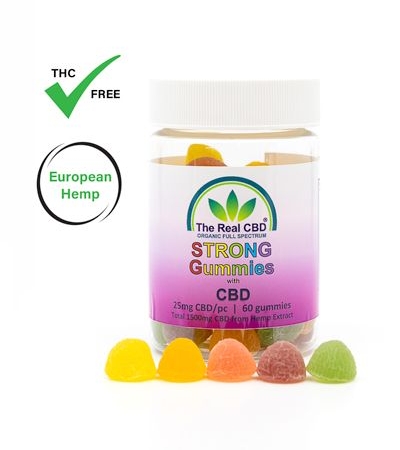 CBD gummies – 25mg CBD€36.00
CBD gummies – 25mg CBD€36.00 -
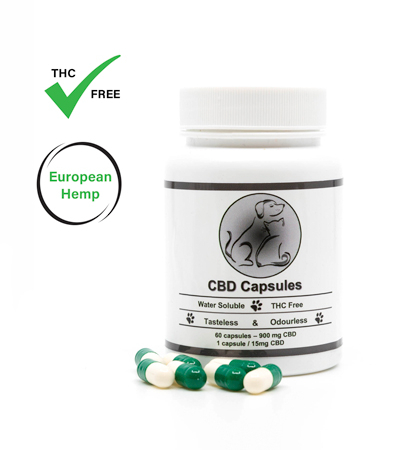 5% CBD Capsules for Pets€59.00
5% CBD Capsules for Pets€59.00 -
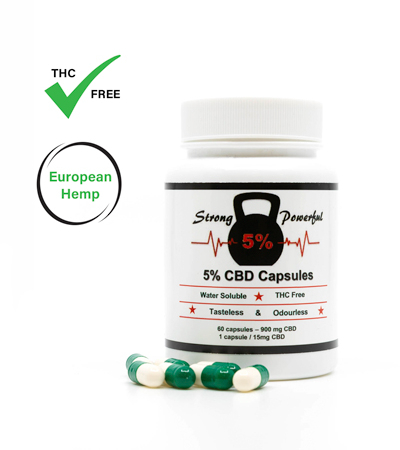 CBD Capsules for Athletes€59.00
CBD Capsules for Athletes€59.00 -
Product on sale
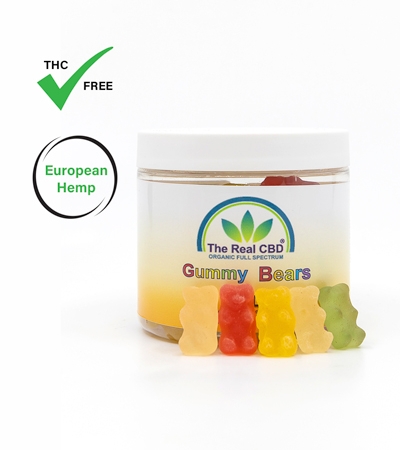 CBD Gummy Bears – 5mg CBDOriginal price was: €19.50.€14.50Current price is: €14.50.
CBD Gummy Bears – 5mg CBDOriginal price was: €19.50.€14.50Current price is: €14.50. -
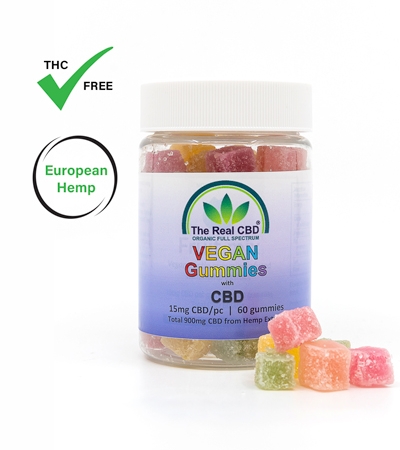 CBD Vegan gummies – 15mg CBD€29.00
CBD Vegan gummies – 15mg CBD€29.00 -
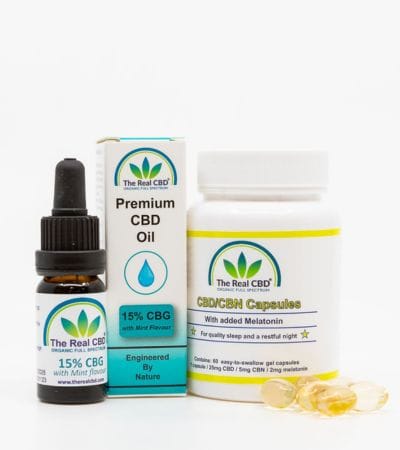 CBD Anti Anxiety Pack€179.00
CBD Anti Anxiety Pack€179.00 -
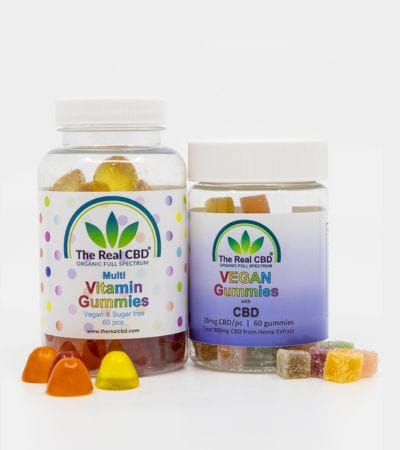 CBD Gummies Vegan Pack€39.00
CBD Gummies Vegan Pack€39.00 -
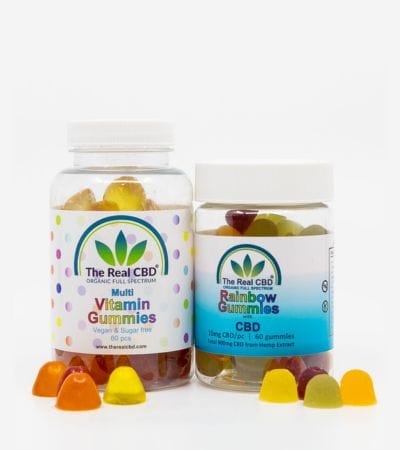 CBD Gummies Everyday pack€39.00
CBD Gummies Everyday pack€39.00 -
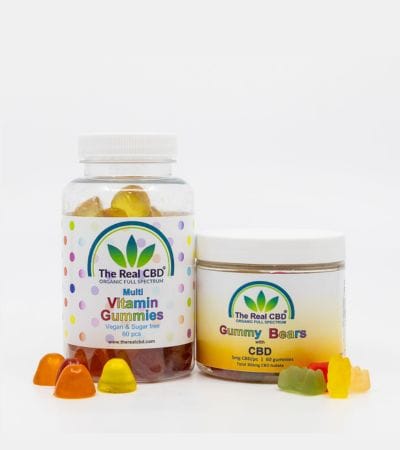 CBD Gummies Youth Pack€24.00
CBD Gummies Youth Pack€24.00 -
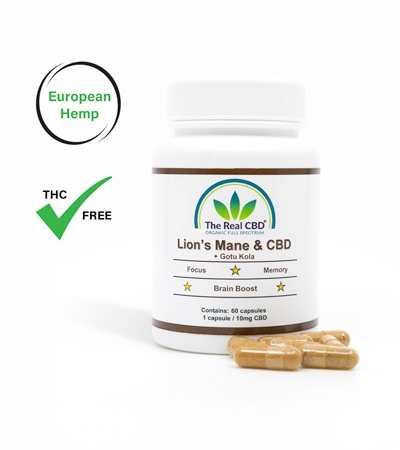 CBD and Lion's Mane Capsules€55.00
CBD and Lion's Mane Capsules€55.00 -
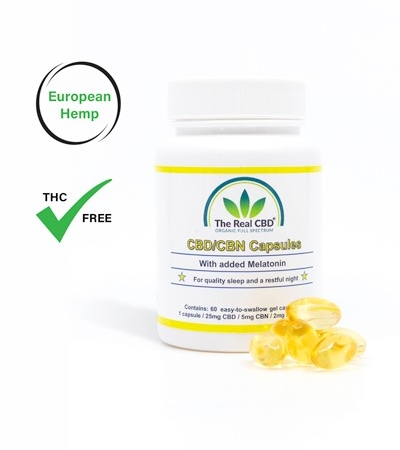 CBD/CBN and Melatonin Soft Gel Capsules€60.00
CBD/CBN and Melatonin Soft Gel Capsules€60.00 -
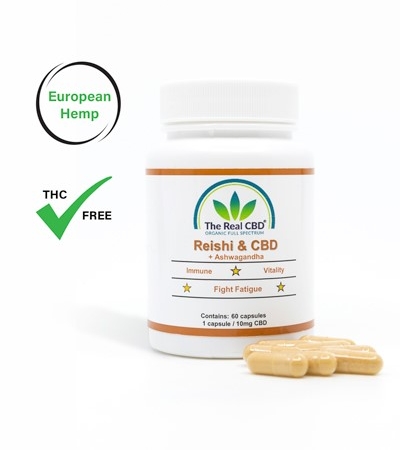 CBD and Reishi Capsules€55.00
CBD and Reishi Capsules€55.00 -
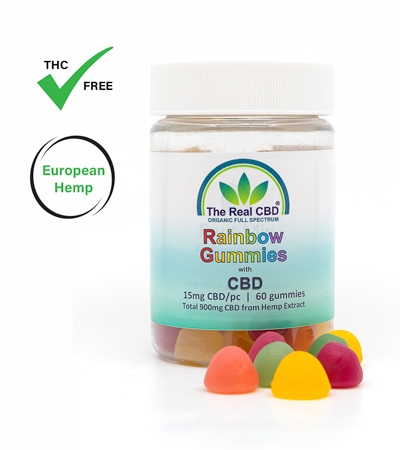 CBD gummies – 15mg CBD€29.00
CBD gummies – 15mg CBD€29.00 -
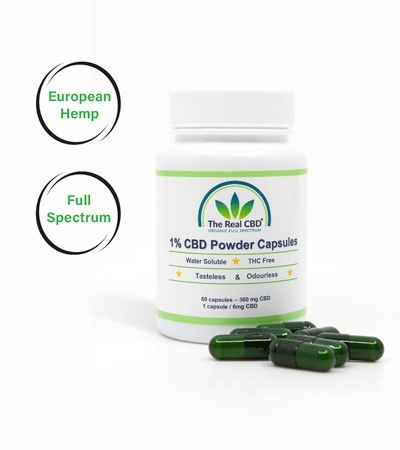 CBD Capsules – Water Soluble – 1%€29.00
CBD Capsules – Water Soluble – 1%€29.00

I am a certified expert in Medicinal Cannabis. We are all about giving correct and trustworthy information. We know how important it is to learn about CBD and cannabis, which is why we want to be your go-to source for trustworthy information. We help you improve your health by using our knowledge and experience as a starting point.

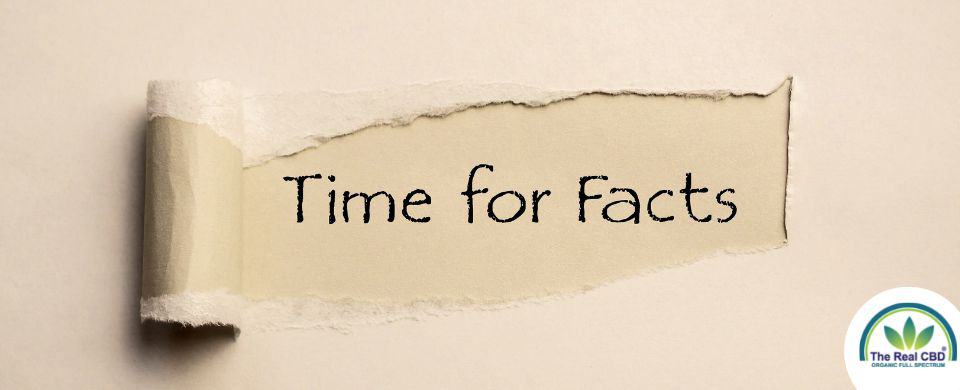




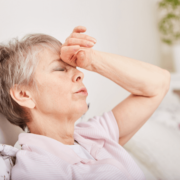


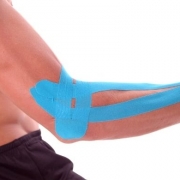




Leave a Reply
Want to join the discussion?Feel free to contribute!